“Weep With Those Who Weep”
A Plea for Evangelical Compassion in the Wake of Violence Against Latter-day Saints
The woodcut above is the frontispiece of Mormonism Unvailed (1834), the first full-length anti-Mormon book. The caricature of Joseph Smith literally being kicked by Satan while clutching the gold plates (Book of Mormon) is satire, sure, but let’s be honest, it’s a visual shorthand for contempt.
From the very beginning, polemics against the Latter-day Saints have relied on ridicule, exaggeration, and demonization. Nearly two centuries later, our rhetoric often hasn’t moved far from this impulse. What was once printed in woodcut now circulates in memes, tweets, and sermon clips, and the fruit is the same: dehumanization.
Such a thing has awful, evil consequences.
On Sunday, September 29, a gunman entered a Latter-day Saint meetinghouse in Grand Blanc, Michigan. By the time it was over, four members of the congregation were dead, others were wounded, and the building itself was reduced to ash. The shooter, Thomas Jacob “Jake” Sanford, was a veteran with a history of mental health struggles. Investigators are still assembling the picture, but reports already suggest one grim certainty: he carried a particular hatred for the Latter-day Saints. That hatred turned into violence, and it cost innocent lives. This, at a time when the LDS Church had just lost is president, Russell Nelson.
When news reached me, I opened evangelical corners of the internet to see how others were reacting. It only took mere minutes before I saw what I had feared but expected.
Instead of grief, I saw boundary-marking.
Instead of lament, I saw whataboutism.
Instead of compassion, I saw concern thinly veiled as care.
This wasn’t true everywhere. Some evangelical orgs and podcasts were quick to express sincere condolences and encouragement for prayer. But what I saw was enough to make me think, “Enough is enough.”
For example, I saw one social media account turn the tragedy into an opportunity to highlight LDS doctrinal error, as if a fire and four dead people were the time to rehearse theology. “They’re our neighbors that we ought to care about and care for but”— Stop.
Just… stop with concern-trolling: feigning care while drawing attention away from grief and toward boundary-marking. Feigned compassion without real care is no compassion at all. It’s an emotional lie.
This kind of reaction, along with the others I saw, are the reflexes of a community that’s grown too comfortable with rhetorical shortcuts. We’re so accustomed to defining ourselves against the Other that even a murder scene becomes a platform for it.
Why is that?
I think three dynamics are at work.
The first is that evangelical leaders and influencers fail to appreciate how their voices echo and amplify among their followers. A snide joke from a pulpit or a clever insult on social media may seem like nothing more than edgy rhetoric, and it rewards them with those precious likes and subscribes. But, at a deeper level, it teaches an audience how to imagine their neighbors. And audiences always push further than their teachers.
The second is that much of our rhetoric is unfounded and borders on bearing false witness. We’re quick to caricature Latter-day Saint beliefs, often at the expense of truthfulness. Scripture is plain: “A false witness will not go unpunished” (Prov 19:5). Is Mormonism in keeping with the historic orthodoxy of the Christian faith? By no means. Its very raison d’être was to restore what Joseph Smith believed had been lost, i.e., the true church. But does that give us license to misrepresent it? By no means. Caricature and exaggeration may win applause, but they break the ninth commandment and, in moments like these, they dehumanize.
The third is that we aren’t approaching the Other biblically. Christ calls his followers to gentleness, compassion, and love, even toward enemies (if you want to consider Latter-day Saints this way, which you shouldn’t). How much more toward neighbors? Yet, in our zeal to win arguments, we often lose sight of what the Lord Jesus actually requires, what He actually wants and honors.
Mark Driscoll As a Case Study
Mark Driscoll offers a case study for these three points.
For those unfamiliar, Driscoll rose to prominence in the early 2000s as the brash, foul-mouthed pastor of Mars Hill Church in Seattle. Lots of people in my age group turned or returned to faith because of him. He became a darling of the Young, Restless, Reformed movement, then crashed spectacularly under the weight of his own character flaws. After resigning in disgrace—having refused church discipling and accountability—he simply resurfaced in Arizona, rebranding himself as a charismatic-style preacher. In recent years, he’s leaned hard into MAGA-inflected evangelicalism.
If you want to understand this trajectory in more detail, listen to The Rise and Fall of Mars Hill podcast from Christianity Today.
Now, before going any further, to be extremely clear, I’m not accusing Mark Driscoll of any kind of accomplice, co-conspirator, or instigation in the Michigan murders. I’m calling into question how rhetoric like his is poisoning public discourse and shaping evangelical perceptions of Latter-day Saints under the guise of boldness and truth-telling.
Admittedly, when I first heard Driscoll, I liked him. He resonated with my yearning for a preacher to speak from conviction at the convicted. But the luster waned fast.
Honestly, it was the way he treated Others that pushed me off just as quickly as he pulled me in. That’s especially true of Mormonism, which is why I think Driscoll is a good case study.
The first time I remember Driscoll ever mentioning Mormonism was in an off-handed joke about seeing Mormon missionaries riding their bikes to hell. The audience laughed, he grinned, but I cringed. I realized how easy it was for a cheap laugh to disguise real contempt for Latter-day Saints, and I didn’t like it.
That was years and years ago, but Driscoll recycles material, like any good comedian, so it’s unsurprising he posted something similar in 2023 on Facebook—227 “lols” later. (The comedian comment isn’t a jab; Driscoll himself said from the pulpit he wanted to become one and that pastors should learn from the comedian’s craft. Perhaps so, but he seems to have learned the wrong lessons.)
He’d probably excuse this mockery by pointing to 1 Kings 18, where Elijah taunts the prophets of Baal: “Either he is musing, or he is relieving himself, or he is on a journey, or perhaps he is asleep and must be awakened.” But that passage isn’t a license for ridicule. The point isn’t that mocking idolatry is a pastoral duty, but that idolatry is deadly.
Anyway, fast-forward to September 2024, when he tweeted a photo of the Book of Mormon with the caption, “PSA: this brand of toilet paper doubles as a doorstop.” He later deleted it, but the same clip lingered on his YouTube channel for some reason.
Mockery like this may pass as humor, but it signals contempt—a modern version of the Mormonism Unvailed frontispiece.
Less than a year later, when Charlie Kirk was assassinated, Driscoll declared online: “The assassin was a Mormon. This is not the same as Christianity. It is a demonic cult. Mormonism’s Jesus is no closer to the Christ of the Bible than Islam’s Jesus is.”
Turns out, the assassin wasn’t “Mormon” in the sense Driscoll assumed, but that was beside the point. Accuracy yielded to the reflex of demonization. “The assassin was a Mormon” has baked into it the implication that no true Christian would assassinate someone, especially not a religious political leader. The mob at Carthage in 1844 would beg to differ.
Anyhow, the very next day, Driscoll escalated: “There will be zero Mormons in Heaven. It is a demonic cult. A literal demon is on the top of every Mormon building.”
What began as ridicule metastasized into unhinged theological assault, damning an entire people as demonic.
If the people are members of a demonic cult, and the buildings feature demonic symbols, then why be surprised when someone with mental illness and hatred toward Latter-day Saints eventually treats them like enemies to be destroyed?
Sadly, tragically, someone did.
In the aftermath, Driscoll posted a softer line in response: “The murder of innocent people is evil, no matter if they’re Jewish, Muslim, Mormon, or Christian.”
Well, no duh, Mark. Good on you for recognizing the act was evil. But words can’t be unsaid, and caricatures can’t be erased by belated disclaimers.
Listen:
What leaders do in moderation, followers do in excess.
Read that again.
If a pastor calls the Book of Mormon a doorstop, a follower may call it trash. If a leader brands the LDS Church a demonic cult, a follower may feel justified in treating Latter-day Saints less than human. And if contempt becomes normalized, some one will eventually embody it in action.
And some one did.
And now people are dead.
A Plea to Evangelicals (Especially Pastors)
This is why I plead with my fellow evangelicals, especially pastors: you have an obligation to tone down your rhetoric.
Stop boundary-marking during the moment of grief. Just “weep with those who weep.”
Stop excusing or minimizing with whataboutism. Just “weep with those who weep.”
Stop concern-trolling with pious-sounding disdain. Please, just “weep with those who weep.”
“There is a time to weep [and] a time to refrain from embracing” (Eccl 3:4–5), i.e., a time to lament with Latter-day Saints and a time to pull away from them when theological disagreements arise. I thought common sense was sufficient enough to help us discern when these moments occur, but apparently not.
In the end, just obey the Bible we claim to revere as inspired, inerrant, and infallible. Find better ways to explain disagreement.
Think about how you’d want to be treated, “then grab the initiative and do it for them” (Matt 7:12 MSG). No one wants to be a proselytism project. Bear the fruit of the Holy Spirit (see Gal 5:22–23) and express “genuine love; by truthful speech, and the power of God” (2 Cor 6:6–7 ESV). Put on “compassionate hearts, kindness, humility, meekness, and patience” (Col 3:12 ESV), and when it comes to disagreements, discuss them with gentleness (see 2 Tim 2:25). Never perpetuate caricatures or outright lies about Mormonism, as this is tantamount to bearing false witness against your neighbor. Such behavior “shall not be unpunished” (Prov 19:5) because Jesus warned “on the day of judgment people will give account for every careless word they speak” (Matt 12:36 ESV). Tame your tongue (see Jas 3:8) and, in our digital age, tame your thumbs, too. Don’t post things about Latter-day Saints privately that you wouldn’t do so publicly. Foster dialogue that is edifying (see 1 Cor 14:26), charitable (see Col 4:6), and conveys genuine care (see Gal 5:14; Jas 2:8). Avoid unnecessary controversy (see Titus 3:9). “Refrain from anger and give up your rage” (Ps 37:8 CSB) because “an offended brother is harder to reach than a fortified city” (Prov 18:19 CSB). Latter-day Saints are especially averse to anger because the Book of Mormon warns them that “he that hath the spirit of contention is not of me [Jesus Christ], but is of the devil” (3 Nephi 11:29). Abhor pride (see Prov 27:2). “Follow not that which is evil, but that which is good” (3 John 11). Glorify God through Christ by acknowledging him in all things, “and he shall direct thy paths” (Prov 3:6) by the Holy Spirit. “Let all that you do be done in love” (1 Cor 16:14 ESV).1
If you think explaining to thousands of people how Mormons aren’t Christian while the coroner is still transporting murdered bodies to the morgue isn’t uncharitably “careless,” then you’re deceived.
If you can, with a straight face, tell me that joking about cycling to hell and equivocating the Book of Mormon with toilet paper and doorstops and calling the LDS Church a demonic cult is something “done in love” to Latter-day Saints with “compassionate hearts, kindness, humility, meekness, and patience,” then you’re deceived. That kind of rhetoric paves the way for something truly demonic.
Four Latter-day Saints are dead.
Will evangelicals continue to perpetuate careless words that dehumanize our LDS neighbors, or will we learn to speak to truth with love, compassion, and respect? Our rhetoric can either sow seeds of hate or bear witness to Christ.
May God give us the wisdom and humility to choose the latter.
Update (October 1, 2025):
Since writing this, Mark Driscoll has offered what amounts to a contextualized excuse. It’s not an apology. Saying murder is evil is the bare minimum, not repentance. Repentance would mean naming his reckless words as foolish, owning the harm they cause in aggregate to the evangelical Zeitgeist, and refusing to repeat them. Until then, his rhetoric continues to fuel contempt.
Again, I am not (nor ever would) directly blame him for the murders. I am singling out his rhetorics as a prominent example of reckless evangelical rhetoric that normalizes contempt.
Excerpted from 40 Questions About Mormonism



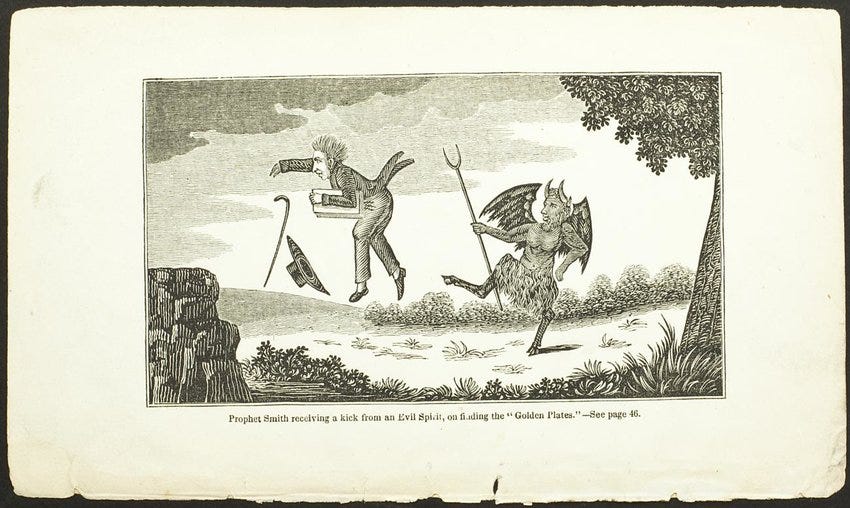


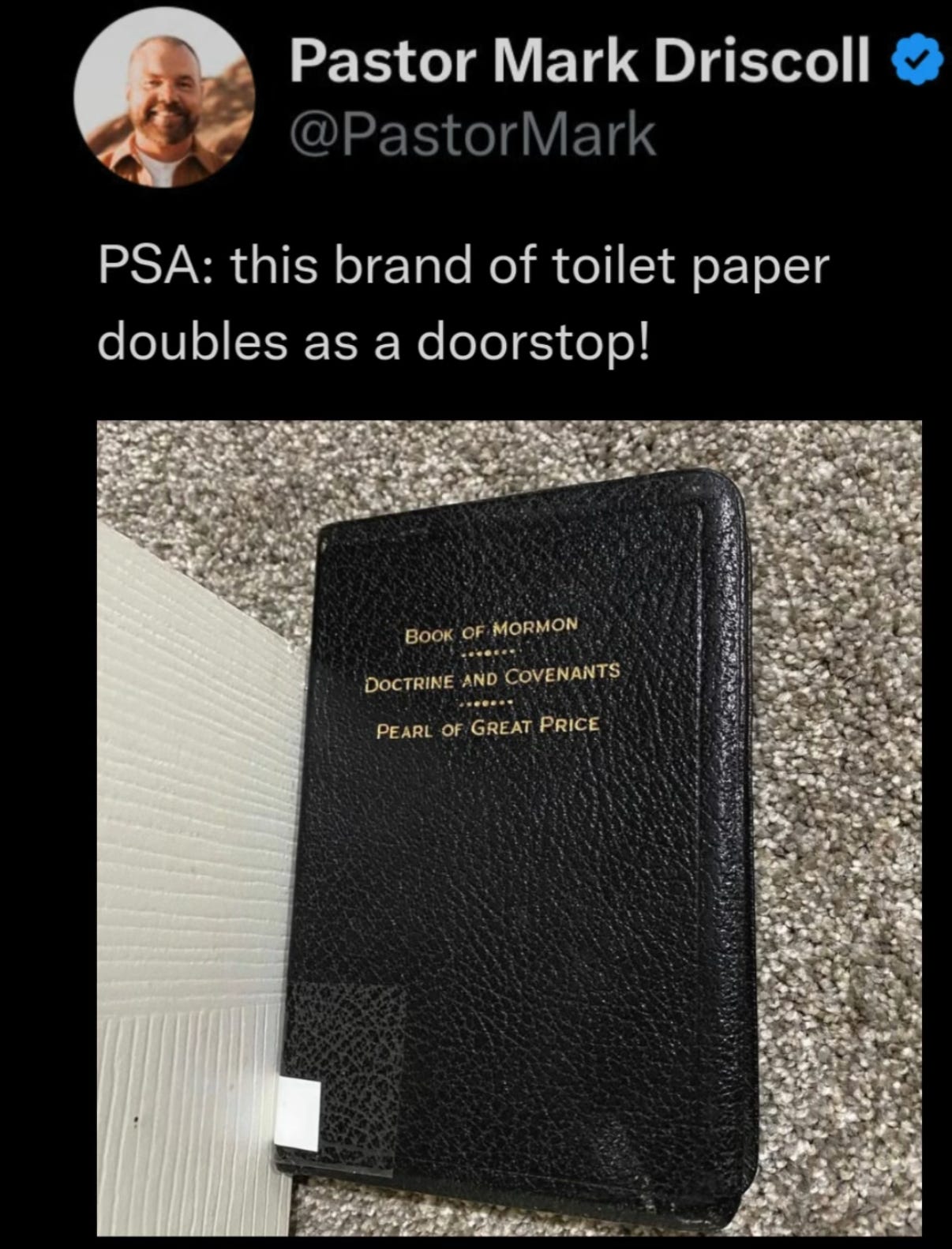

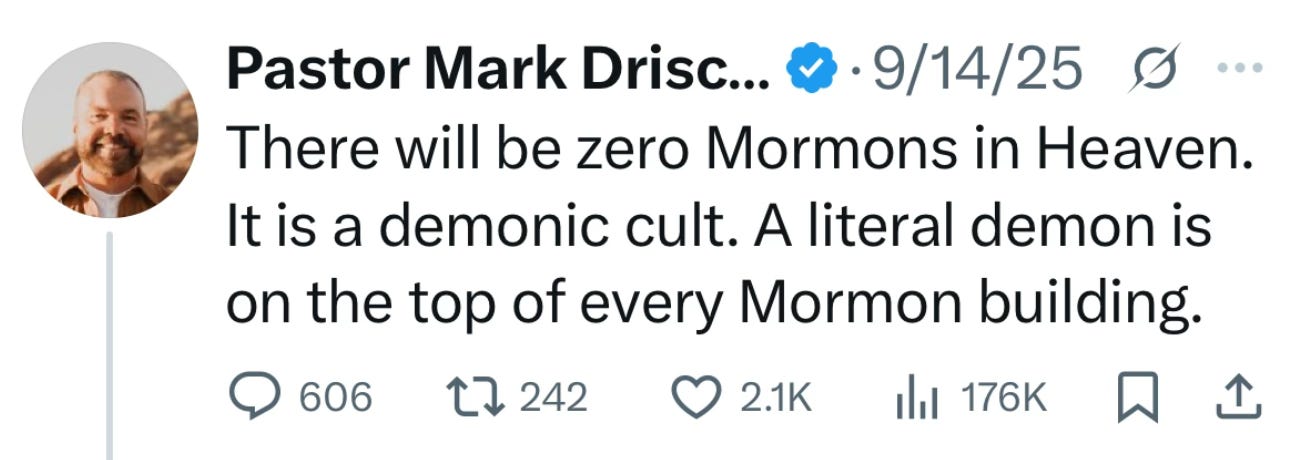
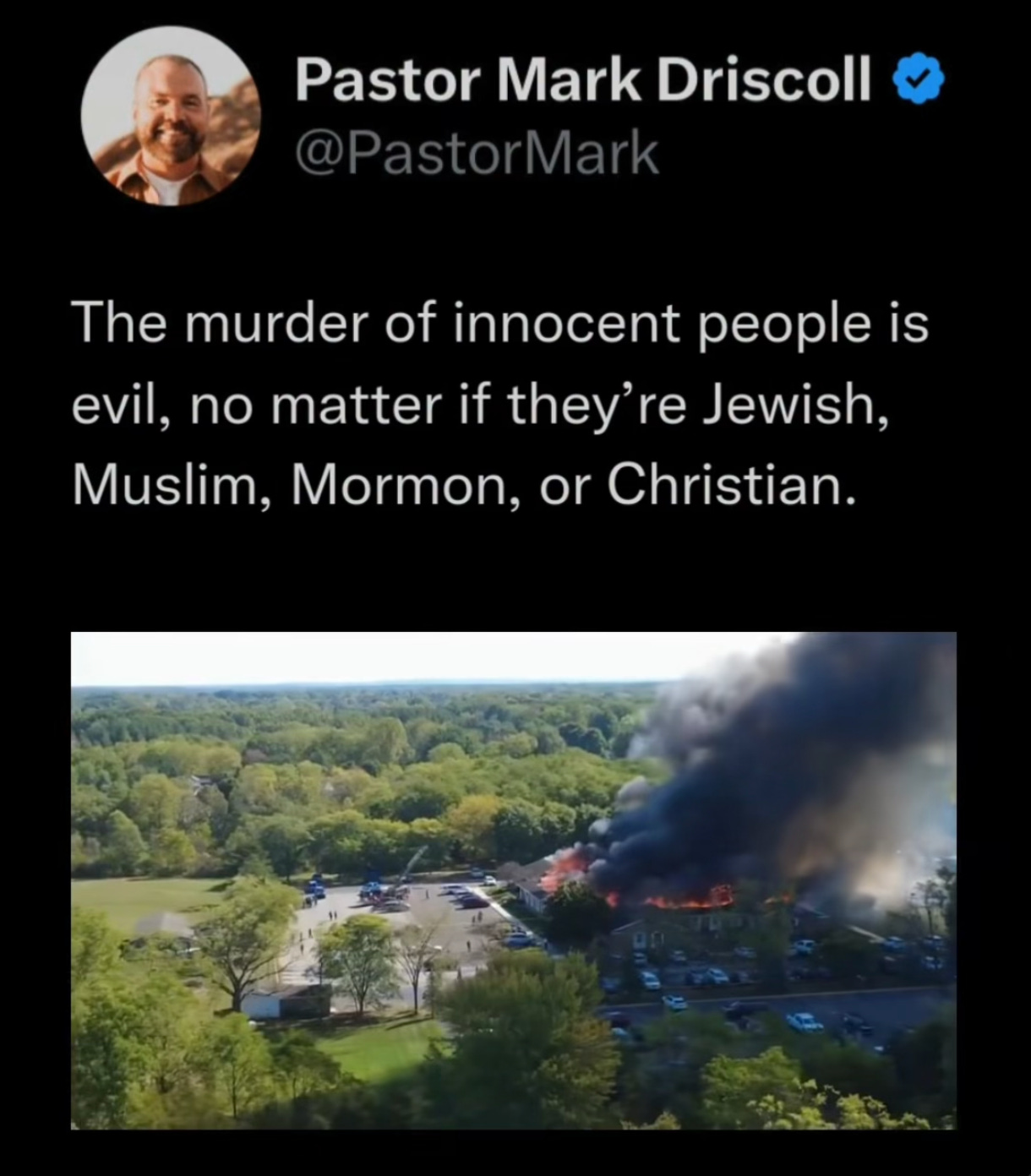
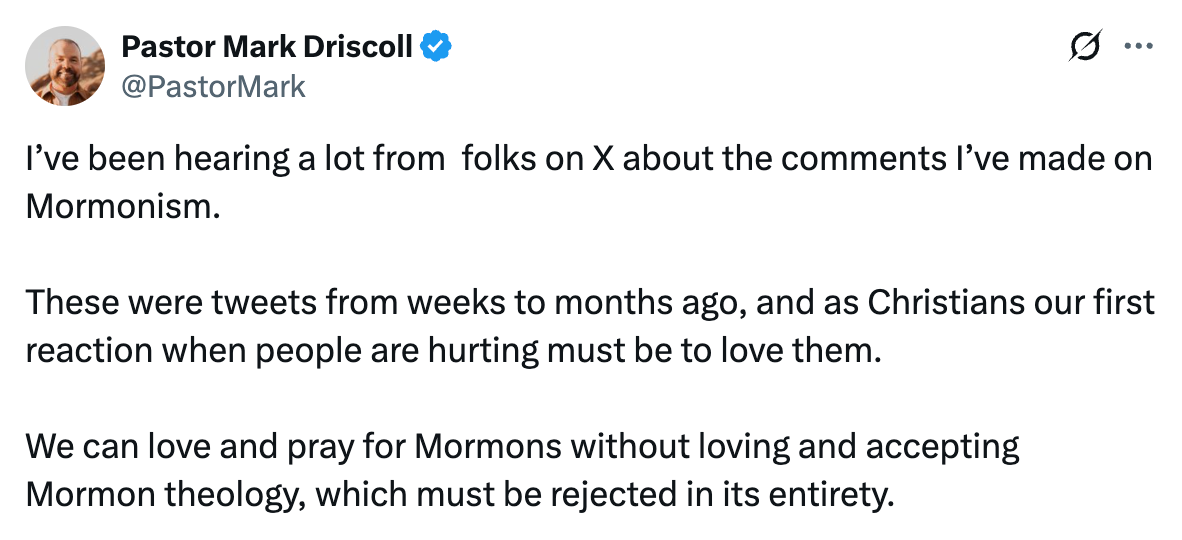

My honest initial reaction to the shooting was "I'm surprised it took this long". I've seen so much open anti-Mormon hate in my life that I've been expecting this for years.
Less than 12 hours before the shooting, I was at a BYU-Colorado football game, and only a few minutes into the game, the Colorado crowd began chanting "F*** the Mormons!". I don't attend many BYU football games, but the reaction of the friends I was with was notable: they weren't at all shocked that it was happening; they only expressed surprise that it was happening so soon into the game. After the game, while walking back to our car, we passed numerous Colorado fans saying all kinds of derogatory things about Mormons...again, it's all par for the course. Gratefully the University of Colorado leadership released a statement of apology a day after the game. Apologies are nice, but there's a broader problem in the culture that allows things like that to happen routinely. There's a broader problem in the culture when a mean-spirited musical mocking the faith not only gets produced but is showered with awards, has a 15+-year run and earns over $800M. There's a broader problem when shows like "Big Love" and "The Secret Lives of Mormon Wives" get made not as an honest look at the faith but as TV ultimately meant to mock and portray the faith at its worst and perpetuate harmful stereotypes. None of this happens to almost any other religion in America, and frankly I see few people outside of the church--certainly to major voices in the culture--standing up for the Mormons when it does. I am frankly tired of doing my best to follow the teachings of Christ and be a good neighbor and have all of that effort be rewarded with some manner of public scorn.
There is no doubt in my mind that incidents like what happened at the game and what happened at the church in Michigan will definitely happen again.
It really does mean a lot to me, Kyle, that you're willing to speak up in this manner. I wish that there were more like you out there.
I do not understand the hatred towards Mormons. As a religion, I think it is one of the best. I admire how they take care of each other. It is tempting to me to be a part of a group like that. Chuck’s best friend in the navy was Mormon. They truly cared for each other. This friend invited him to visit Mobile to meet his family and hopefully fall in love with his sister so they could be brothers. But sadly for Jim, Chuck had already met me and God had different plans for him. Life takes strange twists and here we are many years later, in Mobile. Jim and his family had already moved to Houston.